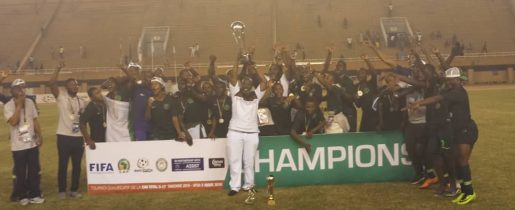Samuel Chukwueze’s rise with Villareal in Spain is a time that the Nigerian Football Federation (NFF) should take stock and, perhaps, do some chest thumping.
Of course, such time for celebration is rare for a federation like Nigeria’s where the litany of wrongdoings mar the day. But there are, indeed, moments like the rise of Chukwueze and others when celebration becomes deserved.
The federation has, and deservedly so, endured criticism for condoning rampant age cheating in youth tournaments resulting in several on-field victories but very little in development of new talents for the senior level. The logic of the critics is that if Nigeria was, indeed, ‘cleanly’ winning the U17 tournament so may times, how come that Nigeria has yet to win the World Cup at the senior level.
Although, such criticisms are themselves largely spurious, they were and in some ways continue to be apropos in pushing the federation to do the right thing. A deep examination of the logic that a U17 Cup victory should lead to a World Cup win is logical on paper but too simplistic to be accorded more than a passing glance.
For starters, it ignores the fact that youth teams bear little correlation with what should be expected beyond the teenage age from same playing personnel. The incidences of maturity, uneven talent development, growth inhibitions, and numerous other development issues indicate that making such a logical link is like trying to win a lottery when the odds are stacked against you.
This explains why other nations, including those in Europe and South America, have won the same tournament but have not magically seen a World Cup arrive at their shores within the peak of the playing careers of their U17 heroes. Put the check mark against Switzerland and Mexico who won the U17 in 2009 and 2011 respectively.
But ditching the mantra that winning the senior World Cup is the Buddhists’ nirvana, then you can argue that Switzerland and Mexico have indeed benefited from winning those U17 tournaments. The national teams in those countries have certainly seen a few of those U17 players progress to the senior team and others making headway in clubs in the elite leagues of Europe.

That is exactly why there is cause for celebration of Samuel Chukwueze. The indices of youth achievement are progress at the elite leagues as well as the national team. Chukwueze, along with his colleagues such as Orji Okonkwo, Kelechi Nwakali, and Victor Osimehen are making that headway from the U17 team of 2015.
Before them, the likes of Kelechi Iheanacho, Francis Uzoho, Wilfred Ndidi, Taiwo Awoniyi, and Isaac Success are also on that trail from the 2013 team. Ndidi makes the list because he was a member of the 2013 set even though he was ineligible at the tournament.
The Federation’s decision, about a decade ago, to turn to U13 and U15 programs and to recruiting youth national team players from the academies, instead of the elite league, has to some extent diminished the whispers of age cheating.
Of course, the MRI test has also helped. Unfortunately, while the MRI has eliminated some age cheats, it is also possible that it has eliminated several youths who are legitimately age eligible. Nevertheless, its biggest gain has been to stem the whispers.
The byproduct, it seems, has been to provide Nigeria a pool of players who are increasingly earning opportunities to come through the ranks of clubs in the elite leagues of Europe. That should signal the likelihood of a stronger national team in not too distant future. Already some of the lads like Iheanacho and Ndidi are now fixtures in the senior national teams and the likes of Chukwueze will head that way soon enough.
It is that progress, stemming from decisions taken not long ago, that should be celebrated. It is providing symptoms of success. Winning the World Cup is the cream on the cake but that is not the only measure out there, it is the development of the young lads at the elite club levels that will often be the appropriate barometer more than a global tournament that only occurs three times over a player’s career.









